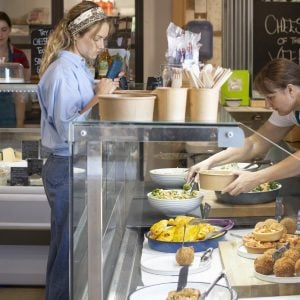
A theft expert has warned independent retailers of the types of behaviour to watch out for after a couple were jailed for eating in several restaurants and failing to pay their bills.
Emmeline Taylor, professor of criminology at City, University of London, set out her advice for delis and farm shops amid a “tsunami of shop theft”.
Port Talbot couple Bernard and Ann McDonagh, 41 and 39 respectively, made headlines after ordering more than £1,100 of food from five outlets without paying.
Research from the British Retail Consortium earlier this year showed that the value of items lost to theft annually had almost doubled to nearly £2bn per year.
Taylor said that while so-called “dine-and-dash” offences were part of the post-pandemic crime wave, they were often justified in a different way to more organised “nick-and-flog” theft.
“Some of it is for the thrill and comes with a sense of entitlement,” she said.
Three distinct groups were most likely to attempt to eat in delis and farm shops without paying, according to Taylor.
“The first is pre-meditated, prolific offenders who have a modus operandi whether it is a fake card or feigning illness – these people are rare but do a huge amount of damage.
“The second group is the alert opportunists, convincing themselves they are prepared to pay but always looking for an excuse not to. Something either didn’t taste right or took too long to come. They will say outright that they’re not paying and they know owners often don’t want a scene.
“Third are the occasional opportunists – these are typically drunk, egging each other on, typically away from home. There isn’t the same sense of guilt if you will never be somewhere again.”
Taylor said food inflation and the wider cost-of-living crisis were driving an increase in all shop theft, along with a perceived police downgrading of violence-free crime.
However, she added that such criminal activity also exacerbated price rises.
“Cafes and shops operate on tiny margins,” she said. “If someone steals, justifying to themselves that it’s built in, the retailers pass that on. It is an honesty tax. Businesses are struggling with high costs.”
A National Police Chiefs’ Council spokesperson said: “Retail crime can have a significant impact on victims which is why we are committed to doing
all we can to reduce thefts and pursue offenders, especially those prolific and habitual offenders who cause misery within the community.”
This article first appeared in the August 2024 edition of Fine Food Digest.



